THE MOTHER OF ALL...
As U.S. Nationals kicks off with the Novice events, and Canadian nationals begin picking which one lady they'll be sending to the Olympics, television viewers in both countries are settling down for a week of drama, nail-biting suspense and pageantry.
They expect to see a parade of world-class athletes, their teams of dedicated coaches, fact-spouting announcers, and a panel of grim-faced judges.
What viewers rarely get to see, except in quick cut-aways at the end of a particularly sterling -- or tragically awful -- program, are the skaters' parents.
(Who can forget all those shots at the 1994 Olympics, of Nancy Kerrigan's visually impaired mother squinting at a huge television screen for a shadowy glimpse of her daughter competing or, in 1996, Todd Eldredge hanging his World Championship medal around his own mother's neck?).
The only time parents seem to be mentioned in skating, its in conjunction with the phrase "Skating Mother" (or rarer, as in the cases of Jill Trenary, Michelle Kwan or Michael Weiss, "Skating Father").
For some, hearing "Skating Mother" (bwahahahaha) is enough to trigger gulps of horror. The grapevine is rife with tales of overinvolved, domineering parents, such as, supposedly, US Champion Tiffany Chin's, a woman so formidable she was nicknamed "The Dragon Lady."
But the fact is, parents of young skaters make so many sacrifices for their child, it's only natural for them to become overinvolved -- and a bit over the top.
One time, Peggy Fleming's mother, minutes before Peggy was set to take the ice at the 1966 U.S. Nationals, insisted Peggy had to have macaroni-and-cheese. Unable to find the serving at any restaurant, Peggy, her mother, and her coach, Carlo Fassi, drove all over the city, stopping at every fast-food place, until they finally found one can of macaroni-and-cheese.
1994 World Champion Yuka Sato won the gold in her home country of Japan while under the tutelage of her father and mother.
Second at those Championships -- and creating quite a stir by ripping off her Silver medal while standing on the podium -- was Surya Bonaly of France. An irrefutably gifted athlete who won the 1987 World Novice Tumbling Championship as well as the 1991 World Jr. Figure Skating Championship, Surya is (even now, as a pro) also coached by her adoptive mother, Suzanne -- a Physical Education teacher with absolutely no skating experience. Though Surya has taken lessons from many coaches over the years, Suzanne has always had the final word on every decision. Arguably, as a result of her mother's refusing to permit Surya a full-time, professional coach, her daughter's international ranking eventually slipped from 2nd in the World in 1993, 1994, and 1995, to 5th in 1996, to failing to make the World team in 1997, to losing her French National title in 1998.
Tamara Moskvina, 1969 World Pair Silver Medalist, and coach of 1998 Olympic Champions Kazakova and Dmitriev and 2002 Olympic Co-Champions Bereznaia and Sikharulidze, has a simple policy regarding skating parents at the ice-rink. "I do not go into their place of work to check if they are doing it correctly, they should not come to mine."
A workable policy to enforce in Russia, where, until the fall of Communism, skating lessons were free, and, since the fall, still complimentary, as long as the child is judged to exhibit potential.
In America, however, according to Moskvina's ex-pair partner, Alexei Mishin, coach of Russian and World Champion Evgeny Plushenko, "Parents pay for lessons, and parents want result right away. Axel! Triple Jump! (A lesson is) twenty minutes and forget it. It's like a Ford factory. Not the way to make champions."
In Russia, the first year of a skater's training includes no jump lessons whatsoever. Instead, aspiring champions are taught correct stroking technique, backward and forward crossovers -- a skill judges most often note as lacking in Western skaters -- and muscle control. They are taught how to distinguish and regulate every muscle in their body, so that when it comes time to finally learn a jump, it's only a matter of telling each muscle what to do. Russians also don't bother teaching Pair overhead lifts until the boy is fully grown, arguing that there's no point, he'll only have to relearn them once he reaches his final height and, in the meantime, lifting too early risks serious injuries.
In America, though, because parents pay the bills, parents call the proverbial tune. For better and for worse.
They expect to see a parade of world-class athletes, their teams of dedicated coaches, fact-spouting announcers, and a panel of grim-faced judges.
What viewers rarely get to see, except in quick cut-aways at the end of a particularly sterling -- or tragically awful -- program, are the skaters' parents.
(Who can forget all those shots at the 1994 Olympics, of Nancy Kerrigan's visually impaired mother squinting at a huge television screen for a shadowy glimpse of her daughter competing or, in 1996, Todd Eldredge hanging his World Championship medal around his own mother's neck?).
The only time parents seem to be mentioned in skating, its in conjunction with the phrase "Skating Mother" (or rarer, as in the cases of Jill Trenary, Michelle Kwan or Michael Weiss, "Skating Father").
For some, hearing "Skating Mother" (bwahahahaha) is enough to trigger gulps of horror. The grapevine is rife with tales of overinvolved, domineering parents, such as, supposedly, US Champion Tiffany Chin's, a woman so formidable she was nicknamed "The Dragon Lady."
But the fact is, parents of young skaters make so many sacrifices for their child, it's only natural for them to become overinvolved -- and a bit over the top.
One time, Peggy Fleming's mother, minutes before Peggy was set to take the ice at the 1966 U.S. Nationals, insisted Peggy had to have macaroni-and-cheese. Unable to find the serving at any restaurant, Peggy, her mother, and her coach, Carlo Fassi, drove all over the city, stopping at every fast-food place, until they finally found one can of macaroni-and-cheese.
1994 World Champion Yuka Sato won the gold in her home country of Japan while under the tutelage of her father and mother.
Second at those Championships -- and creating quite a stir by ripping off her Silver medal while standing on the podium -- was Surya Bonaly of France. An irrefutably gifted athlete who won the 1987 World Novice Tumbling Championship as well as the 1991 World Jr. Figure Skating Championship, Surya is (even now, as a pro) also coached by her adoptive mother, Suzanne -- a Physical Education teacher with absolutely no skating experience. Though Surya has taken lessons from many coaches over the years, Suzanne has always had the final word on every decision. Arguably, as a result of her mother's refusing to permit Surya a full-time, professional coach, her daughter's international ranking eventually slipped from 2nd in the World in 1993, 1994, and 1995, to 5th in 1996, to failing to make the World team in 1997, to losing her French National title in 1998.
Tamara Moskvina, 1969 World Pair Silver Medalist, and coach of 1998 Olympic Champions Kazakova and Dmitriev and 2002 Olympic Co-Champions Bereznaia and Sikharulidze, has a simple policy regarding skating parents at the ice-rink. "I do not go into their place of work to check if they are doing it correctly, they should not come to mine."
A workable policy to enforce in Russia, where, until the fall of Communism, skating lessons were free, and, since the fall, still complimentary, as long as the child is judged to exhibit potential.
In America, however, according to Moskvina's ex-pair partner, Alexei Mishin, coach of Russian and World Champion Evgeny Plushenko, "Parents pay for lessons, and parents want result right away. Axel! Triple Jump! (A lesson is) twenty minutes and forget it. It's like a Ford factory. Not the way to make champions."
In Russia, the first year of a skater's training includes no jump lessons whatsoever. Instead, aspiring champions are taught correct stroking technique, backward and forward crossovers -- a skill judges most often note as lacking in Western skaters -- and muscle control. They are taught how to distinguish and regulate every muscle in their body, so that when it comes time to finally learn a jump, it's only a matter of telling each muscle what to do. Russians also don't bother teaching Pair overhead lifts until the boy is fully grown, arguing that there's no point, he'll only have to relearn them once he reaches his final height and, in the meantime, lifting too early risks serious injuries.
In America, though, because parents pay the bills, parents call the proverbial tune. For better and for worse.






0 Comments:
Post a Comment
Links to this post:
Create a Link
<< Home